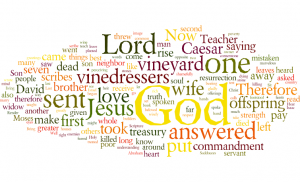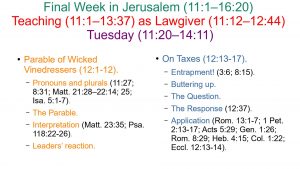Jesus’ Final Week in Jerusalem
Mark 11:1–16:20
Teaching (11:1–13:37)
King (11:1-11)
Sunday: Triumphal Entry (11:1-11).
Lawgiver (11:12–12:44)
Monday (11:12-19).
Tuesday (11:20–14:11).
Lesson from Fig Tree (11:20-26).
Jesus’ Authority Questioned (11:27-33).
 Parable of Wicked Vinedressers (12:1-12).
Parable of Wicked Vinedressers (12:1-12).Pronouns and plurals.
There are a few things to note in the black text before we get into the parable itself.
First we should consider the audience that Jesus is speaking to.
Here it says he was speaking to “them,” and later in vs. 12, “they sought to lay hands on Him, but [they] feared the multitude,” “they knew He had spoken the parable against them,” and “they left Him.” And in the next event, “they sent to Him some of the Pharisees and Herodians” (vs. 13).
Who are they? They are the chief priests, the scribes, and the elders who questioned His authority early Tuesday morning (11:27).
They are the ones who Jesus predicted would reject Him and kill Him (8:31).
And now this parable would reveal that He was aware of the plot, and these leaders knew it (12:12).
But wait, it says He spoke in parables, plural, yet we read of only one here. In fact, Matthew records several parables that Jesus taught that day (Matt. 21:28–22:14; 25), while Mark only records the one.
One more point: it seems that every commentary I have read on this, they want to point out some parallels with the symbolism present in Isaiah 5:1-7.
Certainly, the elements of the vineyard being the Jews and the master being the Lord are there, and it may have been what Jesus’ hearers thought of when Jesus began this parable—but it is a very different parable.
A wealthy landowner leasing his field to people to make something of that field was not uncommon in Palestine during that period.
In this parable, this owner had planted a vineyard, built a hedge around it, dug a trench for the wine vat, and built a watchtower.
The hedge and the tower were built for the protection of the field and the workers within in—this is a similar sentiment we see in Isa. 5, the care and protection given by the Lord.
The owner then decides to hire some people to take care of his vineyard while he is away. They were stewards and could take a portion of the harvest for themselves as payment.
Then it was time for the harvest, “vintage-time,” literally “the right time.”
He sends servant after servant for his portion of the harvest.
The first one is beaten, the second is hit in the head, the third is killed. There is an escalation of terrible treatment from these hired hands, these vinedressers.
After they killed one, later servants were still beaten and some killed.
Then the owner had what he thought was an ace up his sleeve, he would send his beloved only son to them, thinking they would respect him.
There are a couple confusing elements to this parable in my mind, and while I know it’s just a parable illustrative of what was happening at that moment, I still wonder as to the logic of some of their actions.
First, why would the owner think they would respect his only son after killing many of his other representatives? Personally, I would keep my children far away from that place. If they were to kill my other servants, what might they do to my son?
Again, I know this is illustrative of Jesus (later), but it still makes me scratch my head.
Second, why on earth would these vinedressers think that they would inherit this vineyard if they killed the owner’s son? Well, there are some possibilities that Stauffer presents (281).
“The son was the final heir because the father was dead. The [vinedressers] had in mind, since the owner was a foreigner, that they could make arrangement to have the property deeded to themselves.” This doesn’t make sense to me since the owner has kept sending people to collect, and later he would “come and destroy the vinedressers,” so his being dead doesn’t make sense to me.
“Conditions in parts of Palestine were must in flux from this time up to the destruction of Jerusalem and the [vinedressers] believed they could use the advantage political unrest to maneuver the legal system to deed the vineyard to them.” Again, this is a parable, and making it so topical removes its timelessness, so I’m not convinced of this.
“Others apply the insanity of the idea to the irrational character of the Jewish leaders, who were unable to think soberly and sanely about Jesus and the spiritual kingdom which he had been preaching and came to inaugurate.” The commentator sides more with this option, and I tend to agree. Of these three possibilities, this latter one is the most likely.
But I think it may be a combination of #1 and #3. While I don’t think that the owner was dead, it is possible that the vinedressers would try to plead in court that they deserved the vineyard after he does die since he had no heirs. Also, as some might say, it’s so crazy it might just work.
And of course, we do see that the owner takes matters into his own hands, destroying the vinedressers and allowing other people to fill that role.
Interpretation.
The meaning was quite apparent to these Jewish leaders that Jesus didn’t need to explain it to them.
Throughout the history of the Israelite nation, they have continually rejected the prophets of God.
While God has taken care of these people, they would often beat and kill the servants of God, a.k.a. the prophets.
In Matthew’s account, Jesus mentions that this was the case all the way back from Abel to Zechariah (Matt. 23:35).
Some prophets were left alone like Elisha, some God protected like Daniel, but many more had suffered greatly like Jeremiah and even John the Baptist.
And yet the leaders of Israel (the wicked vinedressers) were still out for blood, as they sought to destroy Jesus, and all the more after they heard this parable.
The owner is, of course, God, while the son is Jesus. In effect, Jesus is predicting His death yet again at the hands of these wicked leaders to their face.
The people of God is the vineyard, and they would be given to others who would take care of it properly, faithful Jews and Gentiles.
Jesus then quotes from Psalm 118 further cementing this idea.
As we discussed concerning the triumphal entry, the people are chanting lines from this Messianic Psalm while Jesus is riding into town (Psalm 118:22-26).
Jesus is affirming His place as the Messiah, though it may not be entirely clear to the leaders.
At the very least, He is applying it to Himself, that they are rejecting Him, and that He would become the chief cornerstone.
The Lord had done this, as the Lord had cast out the wicked vinedressers, and it was marvelous!
Leaders’ reaction.
Coming hot off the heels of their discussion on Jesus’ authority, they really wanted to have Him killed, ironically proving Jesus’ parable.
But they were cowards, fearing the people again.
Just as John was regarded as a prophet, Jesus was beloved by the people.
He was healing them and teaching them great things. Many of them were there, laying down clothes and palm leaves as He entered into the city a couple days before.
They likely regarded Him as the Messiah, and the people would retaliate if they acted now.
So they left continuing to hatch their plot to kill Him.
We’ll see their next attempt next time.

